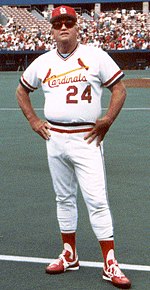Manager (baseball)

In baseball, the field manager (commonly referred to as the manager) is an individual who is responsible for matters of team strategy on the field and team leadership. Managers are typically assisted by between one and six assistant coaches, whose responsibilities are specialized. A manager is essentially equivalent to the head coach in other North American professional sports leagues.
Duties
The manager chooses the batting order and starting pitcher before each game, and makes substitutions throughout the game – among the most significant being those decisions regarding when to bring in a relief pitcher. How much control a manager takes in a game's strategy varies from manager to manager and from game to game. Some managers control pitch selection, defensive positioning, decisions to bunt, steal, pitch out, etc., while others designate an assistant coach or a player (often the catcher) to make some or all of these decisions.
Some managers choose to act as their team's first base or third base coach while their team is batting in order to more closely communicate with baserunners, but most managers delegate this responsibility to an assistant. Managers are typically assisted by two or more coaches.
In professional baseball
Typically, the title of "manager" is only used in professional baseball, with the title "head coach" used at other levels of play.
In many cases, a manager is a former professional, semi-professional or college player. Many current and former managers are former catchers, including Mike Matheny, John Gibbons, Brad Ausmus, Joe Torre, Mike Scioscia, Bruce Bochy and Joe Girardi.
The manager's responsibilities normally are limited to in-game decisions, with off-the-field and roster management decisions falling to the team's general manager. The term manager used without qualification almost always refers to the field manager (essentially equivalent to the head coach in other North American professional sports leagues), while the general manager is often called the GM. This usage dates back to the early days of professional baseball when it was common practice for teams to have just one "manager" on their staff, and where GM duties were performed either by the field manager or (more commonly) by the owner of the team. Some owners (most famously, Connie Mack of the Philadelphia Athletics) carried out both GM and field managerial duties themselves.
Major League Baseball managers differ from the head coaches of most other professional sports in that they dress in the same uniform as the players and are assigned a jersey number. The wearing of a matching uniform is frequently practiced at other levels of play, as well. The manager may be called "skipper" or "skip" informally by his players.
See also
- List of Major League Baseball managers
- List of Major League Baseball managers by wins
- List of Major League Baseball player–managers
- Manager of the Year
- The Sporting News Manager of the Year Award
- This Year in Baseball Awards (including manager)
- Sporting News Manager of the Decade (2009)
- Honor Rolls of Baseball
- American Baseball Coaches Association

